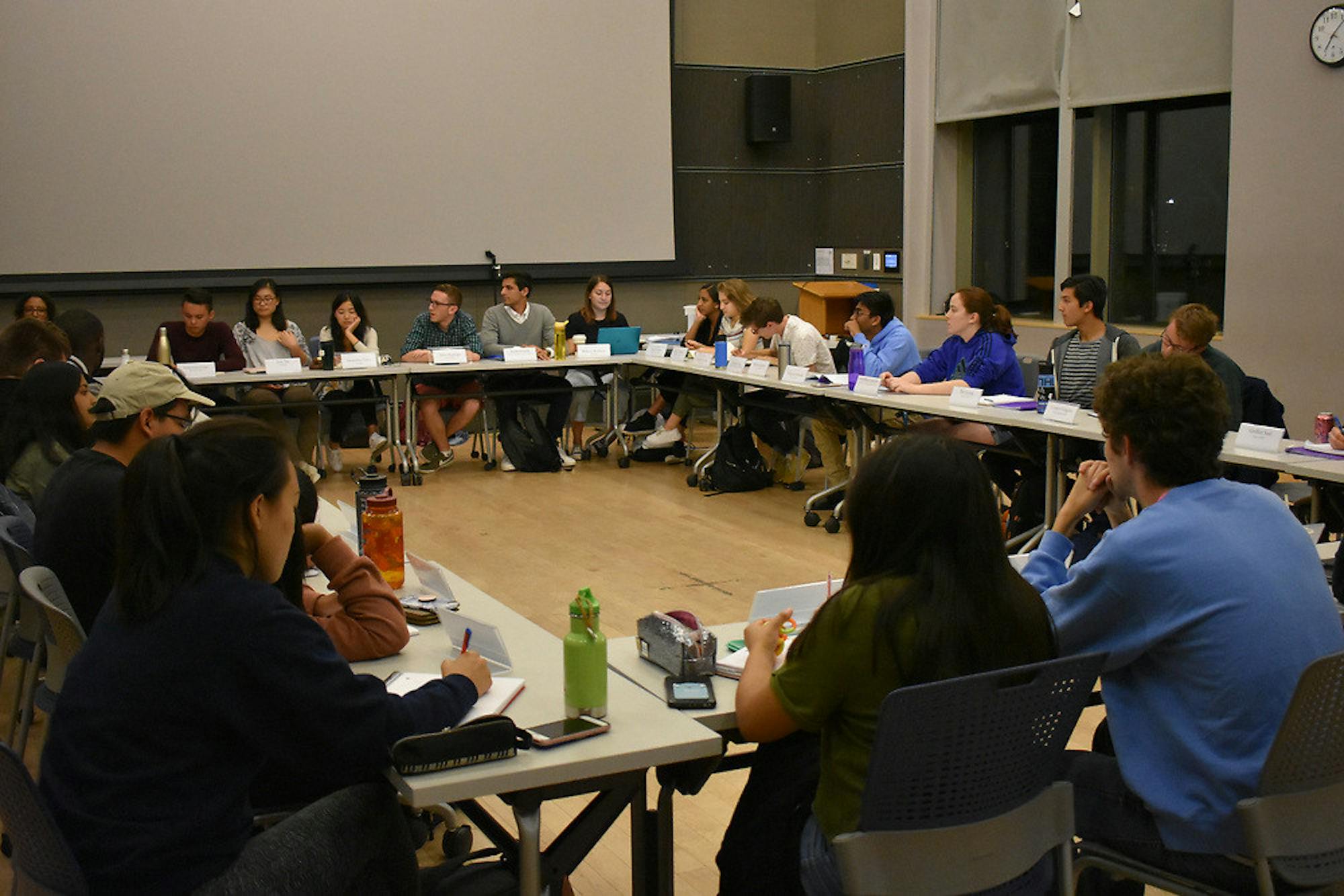The Tufts Community Union (TCU)Senate met Sunday evening in the Sophia Gordon Multipurpose Room for a briefing from Dean of School of Arts and Sciences James Glaser on changes to the university’s administrative structure. Senators also shared committee updates with the body and reviewed supplementary funding requests during the meeting.
Glaser began his presentation by mentioning the recent departures of several deans, including Dean of Admissions Karen Richardson and Dean of Student Affairs Mary Pat McMahon, as both a challenge and opportunity for the university.
“Dean [Jianmin] Qu and I thought that, because so many people were leaving, it actually creates an opportunity for us to really examine, is the organization serving as it should? Are there opportunities to do something different? Are there problems we can address?” Glaser said. “And we went into the summer looking at that.”
During his presentation, Glaser relayed to the body several of the university’s goals in reorganizing its structure.
Highlights of the administration’s listed goals included a desire to consolidate student advising in one place, ensure stability and experience with the hiring of interim Dean of Student Affairs Nancy Thompson while the search for a permanent dean continues and allocate additional resources toward diversity and inclusion programs. Glaser also stressed the desire to improve cross-functionality between administrative offices and lessen the burden of bureaucracy.
He then explained how the recent restructuring aims to address the mentioned goals, highlighting the dissolution of the Office of Student Success Advising, additional administrative support for culture centers and the creation of new titles and roles for several current deans.
“The reorganization resources are coming from all of these high-level people who have stepped out of the university,” Glaser said. “So people say where are you coming up with the money to do these kinds of things, and the answer is through the departures and the salaries of those people who have left.”
After his remarks, members of the Senate had a chance to ask questions. Class of 2022 Senator Deepen Goradia set the tone of the post-presentation discussion by asking Glaser to speak to the state of Tufts’ finances, including recent deficits in both the School of Engineering and the School of Arts and Sciences.
Glaser responded candidly by explaining that the ongoing infrastructure efforts at Tufts have and will continue to result in austerity measures for schools within the university.
“When we add new big costs, the schools have to figure out how to pay for it … And it means that you can have a university with a really tiny surplus, and the schools with deficits because the big costs actually fall on the schools,” Glaser said. “We’ve made a major upgrade to our infrastructure and it was really a long time coming and we went into a period of austerity, which we’ve been in for the last couple of years.”
Many of the following questions revolved around the university’s spending, and how the allocation of resources, or the lack thereof, will affect different constituencies going forward.
Class of 2021 Senator Ayden Crosby asked Glaser how Tufts plans to deal with the particular growing pains that he previously mentioned. Glaser responded by highlighting the importance of the current measures and how they are paying off for students in the long term.
“Our ability to do everything is enhanced by the infrastructure,” he said. “ I’ll just say this: It is hard to keep your approval ratings high in a period of austerity. But the faculty can get behind these projects because they see how important this infrastructure is and we’ve got to make sure we have room in dining halls, we have beds for people living on campus.”
Following Glaser’s appearance before the Senate, TCU Treasurer and Class of 2021 Senator Sharif Hamidi turned the Senate’s attention to several supplementary funding requests from student organizations.
The body had several lengthy debates, focused primarily on whether to regard a clause of their Treasury Procedures Manual (TPM) that restricts the number of members that a student organization can send to certain events using TCU funding.
According to the current TPM, the Senate can only fund six students for a "non-competition trip" that any club takes. While the six-member cap is often broken for individual cases, senators debated whether or not it can or should be applied to the evening’s requests.
Despite the extensive debate which lasted over two hours, the Senate ultimately voted to uphold all of the Allocations Board recommendations, disbursing a total of $13,561 to the evening’s eight requests.
TCU Senate meets with Glaser, debates financial guidelines

The TCU Senate convenes in the Sophia Gordon Multipurpose room on Sept. 30, 2018.





